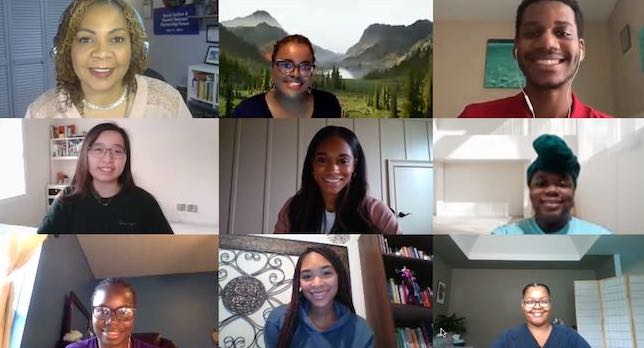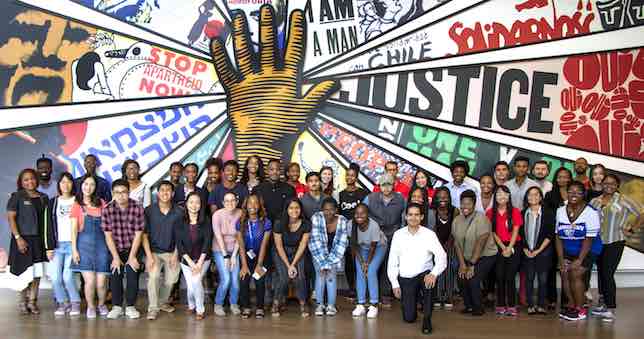When Learning Becomes Leading, Leading Becomes Learning
A Q&A with Tiffany Green-Abdullah
At Georgia State University, students learn not only the technical competencies deemed necessary for "digital literacy"; they learn how to pair their new technical understanding with fledgling leadership skills. And while the GSU program, "Digital Learners to Leaders" (DLL) began as a popular co-curricular option back in 2018, it has gained recognition on campus as a solid support for students' academic, career, and personal choices. It is now incorporated into many of GSU's undergraduate programs.
The university is pushing ahead with its innovative work on DLL, building virtual cohorts and other learning formats to be incorporated further into GSU's curriculum. Now, the original designers of DLL are also excited about the potential to broaden the reach of digital leadership concepts and programs, to offer them at other campuses, companies, and learning organizations.
That's where Tiffany Green-Abdullah, who founded the first DLL co-curricular program and helped steer DLL into academic areas at GSU, is now concentrating her efforts. Through her own consultancy, she's focusing on developing programs in which a combination of digital literacy and design thinking can build better leaders for a rapidly changing and diverse world. We asked Green-Abdullah about her experiences so far — and we think she's a perfect model of DLL herself.

"Leaders are learners and learners are leaders." — Tiffany Green-Abdullah
Mary Grush: Is the notion of "digital leadership" ready to go to a wider audience?
Tiffany Green-Abdullah: For me, yes, it is ready to go to a wider audience, especially if we put together both some generalized and some specialized courseware for people and organizations, to take them through the various layers of digital leadership.
Grush: Is there a major concept that you think is most important for digital leadership right now?
Green-Abdullah: Sure, one that's really current and important now is leading without authority. It's especially relevant in this time, given the many choices and tools people have to express themselves. Even if it were desirable, it would not be easy to hold yourself "over" and dominate other people, given the technological tools those people have to communicate and organize.
So, learning to lead by using your voice to inform and maybe sway people is key these days.
Grush: How would you approach that idea in a workshop?
Green-Abdullah: In our programs, we model leadership and ways to use our voices. And we explore related ideas like how to network and find others who may be thinking along some of the same lines as you.
Grush: And so, it seems like you'd want to be aware of and know how to use technology tools to be able to function well in a networked environment…
Green-Abdullah. Of course. Networking is so critical to sharing ideas. If you really think about all that's going on today, you can easily see why it's important to get that information and related ideas out there to inform and potentially bring people together.
From there, we can actually begin to re-imagine what communities can be about.

A Digital Learners to Leaders cohort opening
Grush: How do you determine what experiences are useful for the students? I would guess that students expect fairly targeted information and experiential learning that's relevant to them.
Green-Abdullah: My mindset has always been on coaching: how to get them to their best, while still factoring in what they want rather than feeling like we have a right to tell them what they want.
One of the features that's critical for success is an inclusive culture, which is what we have at GSU in our DLL program. We look at different ways of solving problems — which is something we want to model in our digital leadership programs.
Grush: How do you model addressing change?
Green-Abdullah: We think that a digital leader must be agile, and that will only become more important over time. If you just take a quick look at the environment, the pandemic, or the recent protests, you can build several arguments as to why a leader must be ready for change and able to respond creatively to any new situation.
Grush: Do you see job skills as the primary reason for developing digital literacy programs at colleges and universities? Is that a priority at GSU?
Green-Abdullah: I have noticed that for digital literacy, many colleges or universities tend to focus on a particular type of technology, or on learning certain technologies that might be helpful in opening up future job opportunities… While we may do a little of that as well, for GSU, and for me, the more important focus — the "why" if you will — is to help students develop a digital identity that is culturally responsive for them, affording them the confidence to learn and re-learn the digital literacy components that will allow them to renew their skills and thrive long term.
Many of our students are African American, and we have a huge international population as well, so having the confidence to learn new things and work well in new environments on an ongoing basis, throughout their long careers, is a great value for them.
Grush: What are some of the approaches you use in your workshops to build that kind of digital leadership?
Green-Abdullah: We explore project management, design thinking, and frameworks that they can go back to and rely on over and over again to solve problems. We bring in current industry professionals and we support students in their career goals — whether that means working in a given industry or starting their own businesses. Ultimately, the outcome is up to them. But they do learn what they need to become leaders who can learn. Leaders are learners and learners are leaders.
[Editor's note: Images courtesy Georgia State University. See also Meg Lloyd's article on DLL at https://campustechnology.com/articles/2020/05/20/cultivating-digital-leaders.aspx. For more information on Tiffany Green-Abdullah's work, visit tiffanygreenabdullah.com.]